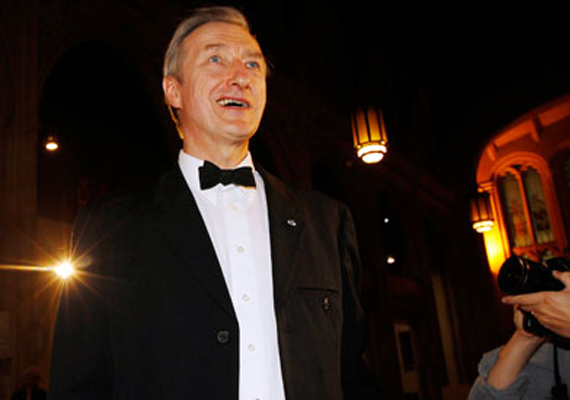Julian Barnes Wins Prestigious Booker Prize
London, Oct 19: It was fourth time lucky for British writer Julian Barnes, who won literature’s Booker Prize on Tuesday after a contest that had as many insults, rivalries and bitter accusations as a paperback pot-boiler.
Barnes, a finalist on three previous occasions who once described the contest as “posh bingo,” finally triumphed with “The Sense of an Ending,” a memory-haunted novel about a 60-something man forced to confront buried truths about his past after the unexpected arrival of a letter.
Former British spy chief Stella Rimington, who chaired the judging panel, said the 150-page novel “spoke to the humankind in the 21st century.”
Barnes, one of Britain’s most critically acclaimed novelists, was previously nominated for “Flaubert’s Parrot,” “England, England” and “Arthur and George.”
The 65-year-old writer conceded that “in occasional moments of mild paranoia” he had wondered if forces were working against him ever winning.
“I’m as much relieved as I am delighted to receive the 2011 Booker Prize,” he said.
Barnes had been the strong favourite to win 50,000 pound ($82,000) award, attracting half of all bets laid through bookmaker William Hill.
He beat five other finalists. Three were British Stephen Kelman for “Pigeon English,” A.D. Miller for “Snowdrops” and Carol Birch for “Jamrach’s Menagerie.” Two Canadian novels rounded out the shortlist- “The Sisters Brothers” by Patrick deWitt and “Half Blood Blues” by Esi Edugyan.
One of the English-speaking world’s most high-profile literary prizes, the Booker is open to writers from Britain, Ireland and the 54-nation Commonwealth of former British colonies. Founded in 1969, it is officially called the Man Booker Prize after its sponsor, financial services conglomerate Man Group PLC.
It always attracts colourful commentary and controversy, but this year’s has been particularly combative, with critics accusing the five judges of dumbing-down after Ms. Rimington said the finalists had been chosen for readability.
The shortlist drew criticism for excluding some of the year’s most critically lauded books, including “On Canaan’s Side” by Ireland’s Sebastian Barry and “The Stranger’s Child” by Britain’s Alan Hollinghurst.
And a group of writers, publishers and agents announced it was setting up a rival award that hopes to supplant the Booker as English literature’s premier prize.
Literary agent Andrew Kidd, spokesman for the new Literature Prize, said the goal was to create an award “where the single criterion is excellence rather than other factors.”
The new prize will be open to any English-language writer whose work has been published in Britain unlike the Booker, which does not allow American entrants.
On Tuesday, Rimington accused the Booker’s critics of patronizing and insulting both authors and judges.
She said the judges were pleased that the batch of six finalists was the best-selling in Booker history.
Though only Barnes was an A-list literary name, the novels’ pacy plots and varied settings from Gold Rush-era America to 19th-century London to pre-war Berlin have appealed to readers.
“I thought that the intelligence world was the place for intrigue,” said Rimington, former director of the MI5 spy agency. “But that was before I met the publishing world.”


No comments:
Post a Comment